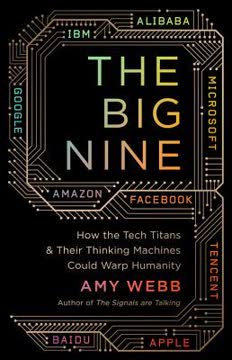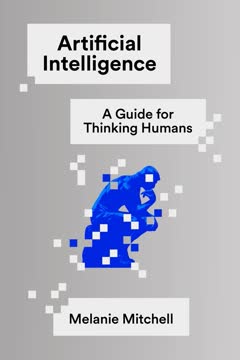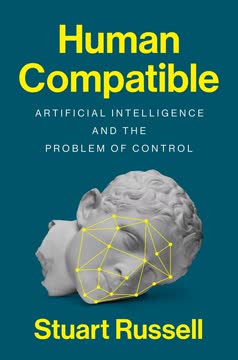النقاط الرئيسية
1. أربع موجات للذكاء الاصطناعي: إعادة تشكيل الصناعات والمجتمعات
ستستغرق الثورة الكاملة للذكاء الاصطناعي بعض الوقت، وستغمرنا في نهاية المطاف على شكل أربع موجات: الذكاء الاصطناعي على الإنترنت، الذكاء الاصطناعي للأعمال، الذكاء الاصطناعي للإدراك، والذكاء الاصطناعي المستقل.
الذكاء الاصطناعي على الإنترنت موجود بالفعل، يعيد تشكيل تجاربنا الرقمية من خلال محركات التوصية والمحتوى المخصص. الذكاء الاصطناعي للأعمال يعمل على تحسين اتخاذ القرارات في الشركات من خلال تحليل مجموعات البيانات الضخمة. الذكاء الاصطناعي للإدراك يقوم برقمنة عالمنا المادي، مما يمكّن الآلات من الرؤية والسمع وفهمنا. الذكاء الاصطناعي المستقل، الذي لا يزال قيد التطوير، يعد بإحداث ثورة في مجالات النقل والتصنيع.
هذه الموجات ليست منفصلة؛ بل تتداخل وتعزز بعضها البعض:
- الذكاء الاصطناعي على الإنترنت: يدعم منصات مثل جوجل وفيسبوك وتوتياو
- الذكاء الاصطناعي للأعمال: يعزز الخدمات المالية، تشخيصات الرعاية الصحية، والتحليل القانوني
- الذكاء الاصطناعي للإدراك: يقود الابتكارات في البيع بالتجزئة، وأتمتة المنازل، وإدارة المدن
- الذكاء الاصطناعي المستقل: يحول الصناعات من خلال السيارات ذاتية القيادة، والطائرات بدون طيار، والروبوتات
2. الصين والولايات المتحدة: القوى العظمى في الذكاء الاصطناعي في حرب تكنولوجية باردة
معًا، حولت هذه الشركات والعلماء الصين إلى قوة عظمى حقيقية في مجال الذكاء الاصطناعي، وهي الوحيدة التي تمثل وزنًا مضادًا حقيقيًا للولايات المتحدة في هذه التكنولوجيا الناشئة.
قوى متناقضة. تتصدر الولايات المتحدة الأبحاث المتطورة في الذكاء الاصطناعي وتجذب المواهب العالمية، بينما تتفوق الصين في تنفيذ الذكاء الاصطناعي وجمع البيانات. تشمل مزايا الصين:
- قاعدة مستخدمين ضخمة تولد بيانات لا تقدر بثمن
- دعم حكومي وتمويل لمبادرات الذكاء الاصطناعي
- نظام بيئي من رواد الأعمال المتحمسين وقدرات التصنيع القوية
إمكانات التعاون. على الرغم من الخطاب التنافسي، فإن تطوير الذكاء الاصطناعي ليس لعبة صفرية. يمكن لكلا البلدين المساهمة في تقدم الذكاء الاصطناعي العالمي:
- الولايات المتحدة: رائدة في الأبحاث الأساسية في الذكاء الاصطناعي وتعزيز الابتكار
- الصين: نشر حلول الذكاء الاصطناعي بسرعة وتوسيع التطبيقات
- إمكانية التعاون عبر الحدود لمواجهة التحديات العالمية
3. فقدان الوظائف: الأزمة الحقيقية للذكاء الاصطناعي التي تلوح في الأفق
في غضون عشر إلى عشرين عامًا، أقدر أننا سنكون قادرين تقنيًا على أتمتة 40 إلى 50 في المئة من الوظائف في الولايات المتحدة.
أثر واسع النطاق. ستؤثر الأتمتة المدفوعة بالذكاء الاصطناعي على الوظائف عبر الطيف، من المهن اليدوية إلى المهن المكتبية:
- المهام المعرفية الروتينية (مثل تحليل البيانات، الكتابة الأساسية) يمكن أتمتتها بسهولة
- الوظائف البدنية التي تتطلب البراعة والقدرة على التكيف ستكون أكثر مرونة على المدى القصير
- الأدوار الإبداعية والعاطفية الأقل عرضة للفقدان الفوري
العواقب الاقتصادية:
- اتساع الفجوة في الدخل حيث يتركز الثروة بيد الذكاء الاصطناعي
- احتمال حدوث بطالة تكنولوجية على نطاق غير مسبوق
- تآكل الطبقة الوسطى وعدم الاستقرار الاجتماعي
4. ما وراء الخوارزميات: أهمية الحب والرحمة الإنسانية
على الرغم من القدرات المذهلة للذكاء الاصطناعي، فإن الشيء الوحيد الذي يمكن أن تقدمه البشرية هو ما نحتاجه بشدة في حياتنا: الحب.
قيود الذكاء الاصطناعي. على الرغم من قوته المعرفية، يفتقر الذكاء الاصطناعي إلى الذكاء العاطفي والقدرة على الاتصال البشري الحقيقي. جاءت هذه الحقيقة إلى المؤلف من خلال أزمة شخصية:
- تشخيص السرطان أجبره على إعادة تقييم أولويات الحياة
- إدراك القيمة التي لا يمكن تعويضها للعلاقات الإنسانية والتعاطف
إعادة تعريف القيمة الإنسانية. مع استيلاء الذكاء الاصطناعي على العديد من الوظائف التقليدية، يجب أن نغير تركيزنا:
- من الإنتاجية والناتج الاقتصادي إلى الرحمة والذكاء العاطفي
- احتضان الصفات الإنسانية الفريدة التي لا يمكن للذكاء الاصطناعي تكرارها
- تعزيز مجتمع يقدر الرعاية والإبداع والروابط بين الأفراد
5. إعادة تعريف العمل: احتضان التعايش بين الإنسان والذكاء الاصطناعي
إذا استطعنا خلق هذه التآزر، فسيمكننا استغلال القوة التي لا يمكن إنكارها للذكاء الاصطناعي لتحقيق الازدهار مع احتضان إنسانيتنا الأساسية.
نموذج تعاوني. مستقبل العمل يكمن في شراكات الإنسان والذكاء الاصطناعي، وليس في المنافسة:
- يتولى الذكاء الاصطناعي المهام الروتينية المعتمدة على البيانات
- يركز البشر على التعاطف والإبداع وحل المشكلات المعقدة
فرص ناشئة:
- الرعاية الصحية: تشخيصات مدعومة بالذكاء الاصطناعي مصحوبة بمقدمي رعاية متعاطفين
- التعليم: أدوات تعلم مخصصة مدعومة بالذكاء الاصطناعي مكملة بمعلمين إنسانيين متعاطفين
- خدمة العملاء: الذكاء الاصطناعي يتولى الاستفسارات، والبشر يقدمون الدعم العاطفي
تحول ثقافي مطلوب:
- الانتقال من رؤية البشر كوحدات اقتصادية فقط
- تقدير ومكافأة الذكاء الاجتماعي والعاطفي
- تعزيز التعلم مدى الحياة والقدرة على التكيف في القوى العاملة
6. بدل الاستثمار الاجتماعي: عقد اجتماعي جديد لعصر الذكاء الاصطناعي
أقترح أن نستكشف إنشاء ما أسميه بدل الاستثمار الاجتماعي بدلاً من دخل أساسي عالمي.
ما وراء الدخل الأساسي العالمي. يقترح المؤلف نهجًا أكثر دقة لمعالجة فقدان الوظائف الناتج عن الذكاء الاصطناعي:
- راتب حكومي للأنشطة الاجتماعية المفيدة
- التركيز على العمل في مجال الرعاية، والخدمة المجتمعية، والتعليم
- مكافأة السلوك الاجتماعي الإيجابي مع توفير الأمان الاقتصادي
تحديات التنفيذ:
- تحديد الأنشطة المؤهلة ومعايير الأداء
- تحقيق التوازن بين حرية الاختيار والفائدة الاجتماعية
- تأمين التمويل من خلال فرض ضرائب على الثروة الناتجة عن الذكاء الاصطناعي
الفوائد المحتملة:
- الحفاظ على كرامة الإنسان وإحساسه بالهدف
- تعزيز مجتمع أكثر تعاطفًا وترابطًا
- توفير الاستقرار الاقتصادي مع تشجيع المساهمة الاجتماعية
7. التعاون العالمي: استغلال الحكمة المتنوعة من أجل مستقبل الذكاء الاصطناعي
لن تمتلك أي دولة واحدة جميع الإجابات على شبكة القضايا المعقدة التي نواجهها، ولكن إذا استندنا إلى مصادر متنوعة من الحكمة، أعتقد أنه لا توجد مشكلة لا يمكننا التعامل معها معًا.
وجهات نظر متنوعة. تقدم الثقافات والمجتمعات المختلفة رؤى فريدة للتنقل في ثورة الذكاء الاصطناعي:
- كوريا الجنوبية: برامج تعليمية موهوبة لرعاية أفضل المواهب
- سويسرا واليابان: ثقافة الحرفية التي تقدر الفن البشري
- كندا وهولندا: تقاليد تطوعية قوية
- بوتان: مقاييس بديلة للتقدم مثل السعادة الوطنية الإجمالية
تجريب السياسات. تتبنى الدول نهجًا متنوعًا في حوكمة الذكاء الاصطناعي:
- أوروبا: تدابير صارمة لحماية البيانات ومكافحة الاحتكار
- الولايات المتحدة والصين: نهج أكثر حرية لتعزيز الابتكار
- فرصة للتعلم من أطر تنظيمية متنوعة
ضرورة التعاون. الطبيعة العالمية لتأثير الذكاء الاصطناعي تتطلب التعاون الدولي:
- تبادل أفضل الممارسات في التعليم وتطوير القوى العاملة
- التنسيق بشأن تطوير ونشر الذكاء الاصطناعي الأخلاقي
- معالجة التحديات المشتركة مثل فقدان الوظائف وعدم المساواة
إن الوكالة البشرية ضرورية في تشكيل مستقبلنا مع الذكاء الاصطناعي. من خلال احتضان وجهات نظر متنوعة وتعزيز التعاون العالمي، يمكننا استغلال إمكانيات الذكاء الاصطناعي مع الحفاظ على إنسانيتنا.
آخر تحديث::
FAQ
What's AI Superpowers about?
- AI Competition: AI Superpowers by Kai-Fu Lee examines the intense competition between the United States and China in the realm of artificial intelligence, highlighting each country's unique strengths.
- Societal Impact: The book explores the profound implications of AI on jobs, the economy, and global power dynamics, discussing both potential benefits and challenges.
- Personal Insights: Lee shares his experiences as an AI researcher and venture capitalist, offering a personal perspective on the evolution of AI technologies and their societal impacts.
Why should I read AI Superpowers?
- Global Dynamics: The book is crucial for understanding the future of technology and its geopolitical implications, particularly how AI will influence global power structures.
- Informed Predictions: Lee provides insights into how AI will transform various industries and job markets, helping readers prepare for upcoming changes.
- Cultural Perspectives: It contrasts the entrepreneurial cultures of Silicon Valley and China, offering a deeper understanding of how these environments foster innovation.
What are the key takeaways of AI Superpowers?
- Transformative Force: AI is not just a technological advancement but a transformative force that will redefine economies and societies.
- China's Progress: China has rapidly caught up to the U.S. in AI, driven by government support, vast data resources, and a competitive entrepreneurial environment.
- Human-AI Collaboration: Lee advocates for a future where humans and AI coexist, focusing on enhancing human capabilities rather than replacing them.
What are the best quotes from AI Superpowers and what do they mean?
- "We’re all full of questions without answers.": This quote reflects the uncertainty surrounding AI's future and the need for societal discussions about its implications.
- "AlphaGo’s victories were both a challenge and an inspiration.": It highlights how technological advancements can spur nations to innovate and compete, especially in AI.
- "Our AI future will be created by us.": Lee emphasizes human agency in shaping AI's future, suggesting that our choices will determine its societal impact.
How does Kai-Fu Lee define AI superpowers in AI Superpowers?
- Superpowers Definition: AI superpowers are nations that effectively harness AI technologies to drive economic growth and influence global affairs.
- China vs. U.S.: While the U.S. has historically led in AI research, China is emerging as a formidable competitor due to its unique advantages.
- Data Importance: Data is a critical resource for AI development, and countries with vast data access will have a significant edge.
What are the four waves of AI discussed in AI Superpowers?
- Internet AI: Enhances online experiences with applications like recommendation algorithms used by companies such as Alibaba and Google.
- Business AI: Optimizes traditional business processes, improving efficiency in sectors like finance and healthcare.
- Perception AI: Interprets sensory data, enabling applications like facial recognition and autonomous vehicles.
- Autonomous AI: Encompasses fully autonomous systems, such as self-driving cars and drones, with profound industry implications.
How does AI Superpowers address the potential job displacement caused by AI?
- Job Loss Predictions: Lee predicts AI could replace 40-50% of jobs in the U.S. within the next 15 years, affecting both low-skill and high-skill positions.
- Historical Context: The book draws parallels to past technological revolutions, suggesting society has historically adapted to such changes.
- Need for Adaptation: Emphasizes the importance of education and policy adjustments to ensure workers can transition into new roles.
What is the significance of the "Sputnik Moment" in the context of AI in AI Superpowers?
- Cultural Awakening: The term describes how AlphaGo's victory ignited a national obsession with AI in China, similar to the U.S. response to the Soviet satellite launch.
- Government Mobilization: Led to significant government investment and policy initiatives aimed at making China a global AI leader.
- Inspiration for Innovation: Served as a wake-up call for Chinese entrepreneurs and researchers, motivating aggressive AI advancements.
How does AI Superpowers compare the U.S. and China in terms of AI development?
- Different Approaches: The U.S. focuses on innovation and individualism, while China emphasizes rapid implementation and government support for AI initiatives.
- Cultural Factors: Cultural attitudes towards technology, data privacy, and government intervention influence AI progress in each country.
- Future Predictions: Lee predicts China may surpass the U.S. in AI implementation due to its advantages in hardware manufacturing and data availability.
What role does data play in AI development according to AI Superpowers?
- Data as a Resource: Data is the most critical resource for AI development, surpassing even computing power and talent.
- China's Advantage: China's vast population and digital ecosystem generate enormous data amounts, giving Chinese companies a significant edge in training AI algorithms.
- Quality of Data: Not only quantity but also the quality of data—how it reflects real-world behaviors and preferences—is crucial for effective AI applications.
What is the proposed social investment stipend in AI Superpowers?
- Definition and Purpose: A proposed government salary for individuals engaging in socially beneficial activities, such as care work and community service.
- Contrast with UBI: Unlike universal basic income, the stipend requires participation in meaningful activities, fostering community and purpose.
- Cultural Shift: Encourages valuing human connections and compassion over solely economic productivity, aiming for a more humane society in the AI age.
How does AI Superpowers envision the future of work?
- Human-Machine Collaboration: Envisions a future where humans and AI work together, with machines handling routine tasks while humans provide emotional and creative input.
- Emergence of New Professions: Predicts new roles prioritizing human interaction and empathy, essential in an AI-dominated world.
- Cultural Shift in Values: Requires valuing care, service, and education as essential societal components, redefining success and fulfillment beyond traditional economic metrics.
مراجعات
يقدم كتاب قوى الذكاء الاصطناعي نظرة شاملة على سباق الذكاء الاصطناعي بين الصين والولايات المتحدة، مستكشفًا تأثيره على الوظائف والاقتصاد والمجتمع. يثني القراء على وجهة نظر لي المتوازنة ومعرفته العميقة بمشاهد التكنولوجيا في كلا البلدين. بينما يجد البعض أن القصص الشخصية قد تشتت الانتباه، يقدّر الكثيرون رؤى المؤلف حول الفوائد والمخاطر المحتملة للذكاء الاصطناعي. يُشاد بالكتاب لسهولة فهمه من قبل غير الخبراء ولأفكاره المثيرة للتفكير حول كيفية التكيف مع مستقبل مدفوع بالذكاء الاصطناعي.
Similar Books















